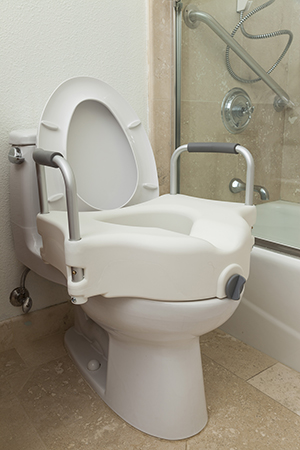A
B
C
D
E
F
G
H
I
J
K
L
M
N
O
P
Q
R
S
T
U
V
W
X
Y
Z
Click a letter to see a list of medical procedures beginning with that letter.
Click 'Back to Intro' to return to the beginning of this section.
After Knee Replacement: Back at Home
You and your healthcare team will evaluate how well you can care for yourself at home. You may need friends, family, or a home health aide to help with chores and errands. Your occupational or physical therapist will teach you the skills needed for daily living with your new knee.
Home safe home
Is your home as safe as it should be? Or, are there potential hazards, like rugs and cords, ready to trip you up? Make sure your home is safe and free of hazards before you return. Ask friends or family to help you rearrange rooms as needed. Tips:
-
Remove throw rugs to prevent slipping or tripping on them.
-
Move electrical cords out of the way.
-
Remove any clutter from the floor, such as books or shoes.
-
Install a rail along one side of staircases.
-
Place items used regularly in cabinets that can be reached without using a step stool.
Bathroom safety
You may need to adjust your bathroom to make it safer and easier to use. Your occupational therapist can help you choose the right equipment for your bathroom. They will also teach you to bathe, dress, and sit more easily in the bathroom.
Tips:
-
Use a long-handled sponge to wash hard-to-reach areas.
-
Use a rubber-backed bathmat to help keep the floor dry and prevent slipping.
-
Sit on a shower chair while you bathe.
-
Use commode chair or elevated toilet seat if your healthcare provider advises you to. This device raises the height of your toilet.
 |
| Your doctor may advise that you use a toilet seat riser. This raises the height of the toilet seat. |
Managing pain at home
You may be prescribed pain medicine to use at home. With pain under control, you’ll get back to an active life sooner. Use pain medicine only as directed. Take each dose as prescribed, before pain becomes severe. Don’t hesitate to take medicine when you need it. Wait about 30 minutes after taking pain medicine before starting an activity, such as exercise. Tell your healthcare provider if the medicine doesn’t control your pain or if you suddenly feel worse. Icing and elevating your leg can also help relievepain.
Online Medical Reviewer:
Raymond Turley Jr PA-C
Online Medical Reviewer:
Stacey Wojcik MBA BSN RN
Online Medical Reviewer:
Thomas N Joseph MD
Date Last Reviewed:
7/1/2022
© 2000-2024 The StayWell Company, LLC. All rights reserved. This information is not intended as a substitute for professional medical care. Always follow your healthcare professional's instructions.